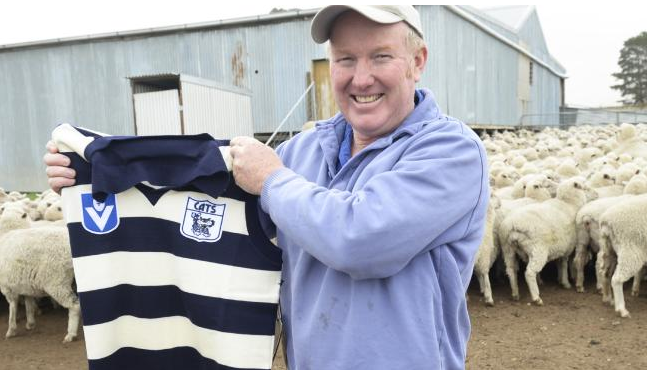Wool from Ewen Peel’s farm at Inverleigh used in this year’s AFL jumpers
THE WEEKLY TIMES – Thursday 11 May 2016, SARAH HUDSON
IT has been a tough few years on Ewen Peel’s 1200ha mixed cropping farm at Inverleigh in Victoria’s Western District.
“We have had a run of dry finishes and reasonable winters,” said Ewen, who runs the fifth-generation property with his father Ross.
“The last good year would have been about 10 years ago.”
So it fell to the Peels’s flock of 1200 self-replacing Merino-Dohne ewes to shed a little light relief on the property.
It was a few weeks into this year’s AFL footy season when Ewen received a phone call from Australian Wool Innovation and his Elders wool agent.
“At first I thought it was a scam. They were telling me I’m one of 25 wool growers in this year’s AFL jumpers,” Ewen said.
“But then they explained their ability to trace bales of wool through the processor, using the combined certificate from the yarn maker.
“They’ve been able to keep track from the buyer and through to the fleece being made into yarns by the AFL.”
A keen Geelong supporter, Ewen is now the proud owner of an official AFL Geelong jumper, which he plans on wearing to the next game.
Ewen, though, said he was still a little baffled (and chuffed) as to why his wool was chosen, other than the Merino-Dohne mix was “beautifully soft”.
HISTORIC A-PEEL
HISTORICALLY the Peels’s property, Austinmere, settled in the 1800s, had a pure Merino flock, but six years ago they introduced Dohne genetics from Glenaroua near Broadford.
“We were not overly happy with our wool and thought we could improve it,” said Ewen. “But the main motivating factor was mulesing. Because they’re a plainer body they don’t need mulesing. And with the mulesing debate we didn’t want to have to suddenly change overnight.
“The Dohne are nice, well-structured animals with a good covering of wool and good quality.”
Ewen said they cut more weight, (“it’s a massive armful of wool compared to the Merino”), but couldn’t quote a figure. The micron (19) is roughly the same as pure Merino, as was the yield (70 per cent).
The flock is joined in November for a May drop, with lambs fed on crop stubble through the summer.
Wether lams and cull ewe lambs are sold through the yards as store lambs at about eight-nine months
Ewen said he was considering adding White Suffolk or Poll Dorset genetics for better store lambs in the future.
The Peel property has a low stocking rate so that they don’t ever buy supplementary feed, relying on phalaris paddocks, their own hay and barley.
Aside from the sheep, the Peels also graze 80 Angus cattle, with cropping their key focus.
About a third of the farm is in wheat and two-thirds barley, canola and faba beans.
TRIAL CASE
IN PAST years the property has been part of Southern Farming Systems and GRDC cropping trials, which has impacted Ewen’s production methods, now sowing earlier and with different varieties.
A decade ago he began sowing around mid-May, but that sowing window has been brought forward almost a month to take advantage of higher soil temperatures and warmer air.
The result is stronger crops that compete with weeds, withstand winter and don’t rely on in-crop chemicals.
“Research pointed that this is the best way to do it and we get better results,” he said.
Usually he would direct drill seed around April 20 but with this year’s dry conditions it was a week later, from Anzac Day.
“It’s more conducive to good, early growth, while things are warmer. If you can get the crop up and established before the cold, then the crop does better.”
Ewen applies most chemicals prior to sowing or straight after, which work long enough until the crop grows and can out-compete them.
DRY ARGUMENT
THE average rainfall in Inverleigh is 500mm but in recent times it is more like 400mm, with a duplex soil of loam above a heavy clay subsoil.
Last year was successful until they had no rain from September and a hot October fried their beans and canola — “it was a disaster”.
Barley yielded 4 tonnes/ha, wheat 3.5 tonnes/ha, beans 1 tonne/ha and their best crop, canola, was 2 tonnes/ha.
“It doesn’t sound a lot but it was a tough year. ”
In a good year, with crop changes, they now yield 5 tonnes/ha of wheat and barley, 2-3 tonnes/ha of canola and 3-4 tonnes/ha of beans.
Kicking goals: Ewen Peel runs a 1200ha mixed cropping and sheep property at Inverleigh. His wool is being used in this year’s official AFL footy jumpers.












